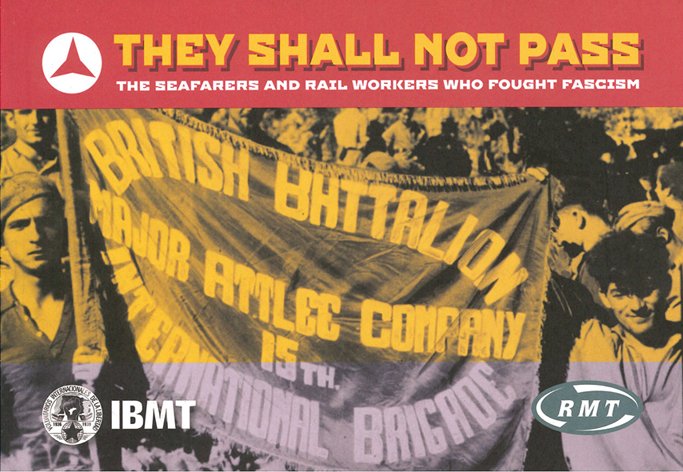
STEVE SILVER spotlights the role of trade unions in countering fascism
VISITORS TO TRANSPORT UNION RMT headquarters in London can see a plaque with the names of over 100 rail workers and seafarers who volunteered to fight fascism in Spain, many of whom never returned. This article is an abridged extract from a new pamphlet produced by RMT and the International Brigade Memorial Trust, which looks at the rise of fascism and what motivated people to go to Spain and fight against it. Ultimately, those who fought fascism in this country or volunteered to fight in Spain went a long way to exposing this poison and ultimately contributed to the victory over fascism in 1945.
On 7 June 1934, at the notoriously violent British Union of Fascists (BUF) rally at West London’s Olympia stadium, a young anti-fascist seaman from Poplar in East London, created a sensation by climbing on the roof of the building and crawling along the girders to a spot above BUF leader Sir Oswald Mosley, where he remained shouting anti-fascist slogans.
The next day’s issue of the Daily Worker newspaper reported: “Several Blackshirts mounted the girders in pursuit, but the comrade climbed out a skylight window. When he got outside the fascists below prepared for his reception, and the Blackshirts above threw stones at him, but they all missed. Buckets of water were also brought into play, but they could not reach the worker.
“Eventually the police were brought in, and the comrade went down the ladder, and was allowed to pass outside.”
Olympia was the first real glimpse of what fascism would look like should it ever take hold in Britain – and it shocked the nation. Eyewitnesses described unprecedented political violence before the eyes of 20,000 people inside and outside the huge Olympia hall. This violence had been well planned, with London’s Fascist Defence Force trained to mete out punishment. Its numbers were swelled by fascist thugs from across the country armed with knuckledusters and other weapons.
Thugs were grouped into small squads and spread all around the hall, as well as out of sight. On the slightest interruption a signal would be flashed and the Blackshirts would spring into action. Meanwhile, Mosley, lit up on stage, would stop his speech while the hecklers were dealt with.
Even the Tory MP Geoffrey Lloyd, Parliamentary Private Secretary to Stanley Baldwin, who attended the rally out of curiosity, was shaken by the experience.
Lloyd told the Yorkshire Post newspaper: “I saw with my own eyes case after case of single interrupters being attacked by ten to twenty fascists. I do not think I saw a single heckler ejected from the meeting in a decent and orderly way. On the other hand, I saw several respectable-looking people, who merely rose in their places and made no struggle, treated with the unmerciful brutality that I have described.
“I can only say it was a deeply shocking scene for an Englishman to see in London. The Blackshirts behaved like bullies and cads.”
Quiet champion
Newly elected National Union of Railwaymen (NUR) General Secretary John Marchbank (below) was not surprised by these events and made it his business to speak out, actions that would lead to one of the most extraordinary legal battles of the period.

Marchbank, a quiet and reserved man, came to lead the NUR in 1933 around the same time that Hitler came to power in Germany and Mosley rose to popularity in Britain.
The NUR leader knew that his union had already crossed political swords with Mosley back in 1931, when he walked out of the Labour Cabinet and formed the New Party, which led to his expulsion from Labour, along with a handful of other of the party’s MPs who followed him.
Mosley’s first electoral contest with New Party was at the Ashton-under-Lyne by-election the same year, following the death of the sitting NUR MP, Albert Bellamy. Much to the chagrin of the NUR, Mosley’s party split the vote, which led to the NUR-backed Labour candidate JW Gordon losing out to the Conservatives.
The New Party became increasingly fascistic and violent, and in 1932 Mosley founded the BUF whose ‘Blackshirts’ were frequently involved in street violence.
The BUF’s foundation initially won widespread popular support and a sizeable following, with the party claiming 50,000 members at one point. Mosley also received a massive media boost when Lord Rothermere, owner of the Daily Mail and Daily Mirror newspapers, wrote articles in January 1934 in both newspapers carrying the headlines “Hurrah for the Blackshirts” and “Give the Blackshirts a helping hand”.
An internal Labour Research Department (LRD) report sent to the NUR during this time marked “Completely confidential” revealed how serious the BUF threat was becoming. It noted: “Fascist propaganda is far more effective and is making more headway than is commonly realised.”
Sued for slander
What happened next remains probably one of the most unlikely political and legal battles of the era when Marchbank, this unassuming former shepherd from rural Scotland, took on the aristocratic fascist leader in the courts almost single-handedly.
Throughout that spring Mosley held more rallies where anti-fascist protestors were viciously beaten, with eyewitnesses reporting the use of excessive political violence rarely seen among fringe groups in Britain before.
Shortly after the Olympia rally, Marchbank addressed a trade union meeting in Newcastle, outlining evidence of “secret instructions issued by Sir Oswald Mosley”, that fascists were active among the armed forces, that certain weapons were recommended for use, including clubs, knuckledusters and knives. Marchbank was reported to have said: “We strongly object to any particular party assembling in the guise of a military machine with the object of overthrowing by force the constitutional government of the country.”
After a report of Marchbank’s speech appeared in the Daily Telegraph, Mosley’s solicitors informed him that he was being sued for slander. The fascist leader had already sued many publications successfully for libel and turned his attentions to the NUR.
However, based on the meticulous collection of evidence, Marchbank decided to fight the allegations based on three points: that he had not said the words alleged in relation to Mosley personally, that the meeting had been a privileged occasion, and that the words that he had said were true.
Finally, in February 1936, after much legal wrangling over the course of five days in court, Marchbank used his defence to publicly give detailed examples of Blackshirt brutality. This included statements by former BUF members on the organisation’s use of violence and its anti-Semitism.
Famously, Mosley won the case but was awarded just one farthing in damages – one quarter of one penny – a humiliating ruling that ended his run of legal wins. Despite this symbolic victory, Marchbank’s costs totalled some £5,518, an enormous sum at the time, and NUR rules prevented any use of the union’s funds to assist him individually.
A testimonial fund committee was set up, which included Labour heavyweights such as Walter Citrine, Clement Attlee, Hugh Dalton, George Lansbury, Ernest Bevin and Herbert Morrison. As a result, all costs were covered, with the remainder used to fight other cases including the Amalgamated Engineering Union (AEU) successfully suing another fascist, and a former Labour MP John Beckett, for libel after he smeared the union in his pamphlet ‘Fascism and Trade Unionism’.
Following these legal victories, the AEU and NUR general secretaries wrote a joint introduction to an LRD pamphlet aimed at trade unionists, called Fascism – Fight It Now.
These legal, physical and ideological battles between trade unionists and the fascists proved to be decisive in deepening the understanding of the true nature of fascism and the threat it represented to workers and the labour and trade union movement.
“They Shall Not Pass: The seafarers and rail workers who fought fascism”, written by Brian Denny, Steve Silver and Jim Jump, costing £5, is available from the RMT webshop at www.rmt-shop.org.uk/books/they-shall-not-pass-book
This article first appeared in the Summer 2024 issue of Searchlight
